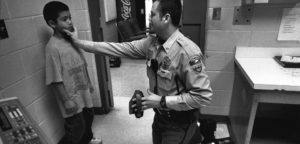
Some stats, again, from Bryan Stevenson’s work with the Equal Justice Initiative:
- One in three black boys will enter the penal system at some point.
- Thirteen states have no minimum age for trying children as adults.
- Children who are tried as adults are disproportionately children of color.
- From the EJI website (eji.org): “The absence of a minimum age also exposes very young children to being held in adult correctional facilities, where they are at increased risk of sexual, physical, and psychological abuse.”
These were not necessarily new ideas to me, or new statistics, but I had to acknowledge during Bryan’s talk that they often lived as abstractions, a result of a life in which I am not forced by my life’s context to face the underlying racism leading to the epidemic of mass incarceration. This context was laid bare in the keynote. As I said in my previous post [http://bit.ly/2gkDcfC], as a white parent with a transracially adopted African-American boy, my son is, for obvious reasons, in the forefront of my thoughts here at PoCC. I was reminded of a conversation I had with a colleague and friend shortly after he was born:
Kitts was my colleague at my previous school, a person of color born in Trinidad, and a friend with whom I have been honored to have a relationship trusting and honest enough to have deep and wide ranging conversations about race, privilege, and the blind spots that we had as individuals and as a school. A week or so after my son was born, Kitts came to talk to me. Instead of her usually gregarious and chatty style, she said, with a seriousness that wasn’t typical of her, “Allen, I have to ask you. Why did you adopt a black boy?” I was stunned at the question, and fumbled around for some answers. One response was that not to have adopted a black boy would have meant that Rachel and I would have had to say that we were unwilling to accept a black boy, which didn’t remotely reflect our values. A second response was that, as an open adoption, my son’s birth mother chose us out of many profiles of multiple races that described who we were in great detail, family pictures and all, and she decided that this is where she wanted to place her baby.
I’ve come to understand that this isn’t what she was asking. I answered the question from the perspective of our decision to adopt. I now know that Kitts was asking, What makes you think you are qualified to guide a black boy through a culture that jails a third of them, follows them suspiciously in stores, crosses the street when they are out walking, and pulls them over as law enforcement, when you haven’t lived this experience?
And my honest answer is, I don’t know. And I can’t know from my own experiences. Which renders my son dependent on our broader community, and our friends and colleagues of color, for things I can’t provide. Last year I read Ta-Nehisi Coates’ book, Between The World And Me, a clear-eyed and unvarnished portrait of being black in a white America, and raising a son in this culture. For me as a white man, it was important continued learning about the daily experience of people of color, learning that I have been building over the last number of years. But for Coates, and for any person of color, it obviously represents the overt and subtle racism that has been inescapably known and experienced since earliest childhood, and that has been known and experienced for generations. I had had the luxury of not knowing, and now this was a wake-up call about my own preparedness to raise my son.
Right now, as an eight-year-old, my son is in a school community that values diversity, reflects who he is, and he is happy, engaged and supported. He’s getting what a young child generally needs. But there will come a time when he may be followed in a store, feared for his skin color and size, or questioned by authorities, and these are not experiences that I, in my whiteness, have had to face. As such, I’m increasingly aware of the need to find other ways to prepare him for his world, opportunities beyond my family. I don’t know yet how to do that, and, like him, I am also dependent on my broader community.
Epilogue: After I drafted this, a colleague, a woman of color read through it. After finishing, she was quiet a bit, then looked up and said, “It sounds like you are saying that there is a set of experiences you are missing that, if you were somehow able to have them, would equip you to prepare your child, and it sounds like you are equating preparedness with safety.” She followed, “I’ve had those experiences as a black woman, and they give me no comfort that I can keep my boys safe. And after a summer of multiple murders of black boys and men, I look at them and I stay scared to death.”
Shortly after this conversation, she sent me this link from the PoCC sessions she was in to a video of 10 rules for children of color to follow if they are stopped by the police: https://m.youtube.com/watch?v=wqJ-psD9vJw&feature=share
I cried when I watched it. My white friends and colleagues who are parents, watch it. Are we even able to imagine our children needing this?
Allen Broyles @allenbroyles









